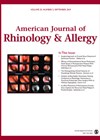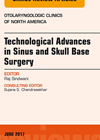
Journal Reviews
Sinus implants to treat recalcitrant polyps
It is well established that the burden of chronic rhinosinusitis on healthcare costs and patients’ quality of life is high, and that current mainstream treatment options of oral or topical steroids are not without problems. This paper compares two RCTSs...
Stenting and sinus surgery
Stents are used in sinus surgery with the aim of maintaining patency of sinus cavity avoiding restenosis from inflammation or scarring. The exact indication for stenting in sinus surgery however is still debated. The authors discussed the potential role of...
Posturography in persistent postural-perceptual dizziness (PPPD)
Those in neuro-otology practice will be familiar with PPPD now appearing in the forthcoming beta edition of ICD-11. This condition combines the symptoms of phobic postural vertigo and chronic subjective dizziness in which anxiety plays a part. The underlying hypothesis...








